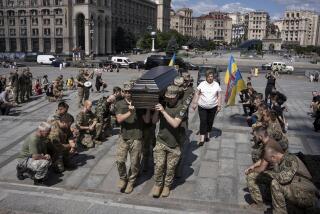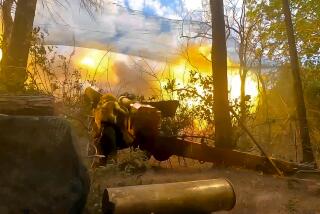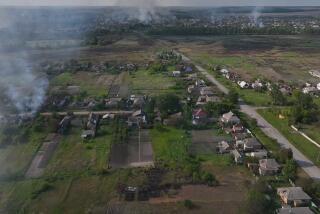Russians Suffer ‘Crushing’ Loss in Rout by Chechens : Caucasus: Rebels control center of capital after fierce fighting sends government soldiers into retreat. Kremlin leaders downplay defeat, vow to take city by week’s end.
- Share via
ARGUN, Russia — Triumphant rebels swaggered through central Grozny on Monday, in clear control of the heart of the Chechen capital after sending the Russian army into humiliating retreat.
On Freedom Square in front of the presidential palace, several burned-out armored personnel carriers testified to the Russian defeat. The charred corpses of Russian soldiers lay nearby.
The failed New Year’s Eve assault on the city was only a temporary setback in what will almost surely be a continued Russian offensive in Chechnya, an oil-rich, mostly Muslim republic that declared independence from Russia three years ago.
But the Chechen victory in Grozny gave the lie to Moscow’s boast that it could easily conquer Grozny and cast Kremlin leaders in the role of bunglers who sent unprepared Russian soldiers to their slaughter.
By Monday afternoon, Chechen fighters in Argun, five miles east of Grozny, said there were only a couple of pockets of Russian troops left in the capital. Russian sources confirmed that troops had pulled back from the central city but said reinforcements were arriving.
The official Russian press service dropped its earlier claim that Russian troops control central Grozny and admitted that Chechen fighters were putting up resistance from 50 positions with artillery, missiles, grenade launchers and flamethrowers.
But the Russians denied that about 600 troops had been killed and 300 soldiers taken prisoner, as the Chechens claimed.
The official press service said “several tens of armored vehicles” had been burned, and that “some” soldiers had been captured, but mostly only the wounded. The press center admitted that Russian forces have suffered losses but did not say how many, remarking only that the death toll was “less than what was expected for this type of operation.”
However, Russian anti-war lawmakers returning to Moscow from Grozny described a Russian rout.
“The troops that entered the city suffered a crushing defeat,” they said in a statement that was also signed by President Boris N. Yeltsin’s human rights commissioner, Sergei A. Kovalev, who remains in Grozny.
“Thousands of civilians have died in bombing raids and under the ruins of their houses,” the lawmakers said. “Hundreds of (Russian) soldiers have died in battle. The government information service is hiding the truth about the casualties. In fact, we are dealing with mass murders that fall into the category of genocide,” they said.
Television footage showed the Russian military Goliath to be made up of dazed-looking teen-agers, while Chechnya’s “Davids” looked like seasoned men in their 20s and 30s, many of them Soviet army veterans.
The rebels said they are desperately short of arms and ammunition. But some danced in the streets with joy at their victory over the despised Russians, under whose rule Chechnya has chafed since czarist times.
“The armor that came into the city was surrounded,” said Isa Aliyev, a 31-year-old Chechen fighter in Argun who had just come from Grozny. “The Russian soldiers who surrender are taken prisoner, and those who don’t. . . . “
Aliyev made a sweeping cut with his hand. Asked what the gesture meant, he answered, “What could it mean in time of war?”
Chechen fighters said many trapped Russian soldiers had taken refuge in Grozny apartments inhabited by ethnic Russians. “They’re being smoked out,” Aliyev said. “The city is being cleaned.”
Russian Defense Minister Pavel S. Grachev said Sunday that the army would “cleanse the city of rebels” by the end of the week.
But the only rebels quitting Grozny on Monday appeared to be the crowds of villagers who had swarmed in a day earlier to defend the city--many of them armed only with their determination. They had been told by Chechen commanders that the capital’s defenders were doing just fine without them.
“I went into town yesterday, but we were just bothering them so they sent us back,” said Idris Idalov, a 41-year-old farmer in the village of Dzhalka to the east of Argun.
Dzhalka, like many other Chechen villages, was having its own problems. With the fight for Grozny temporarily quiet, Russian jets and helicopters intensified their bombing and strafing of the outlying countryside.
In the eastern village of Chechen-Aul, at least one person died when Russian planes bombed the open-air market. Along the road east of Grozny toward Dagestan, which had previously been left unscathed as a route out for refugees who had been urged by Moscow to leave the city, Russian Sukhoi fighters swooped overhead and attacked nearby villages.
They swarmed out of patches of clouds in the blue sky like sharks suddenly appearing in pristine waters.
As before, the Russian bombs and rockets hit mainly civilian targets, giving little military advantage and serving only to further inflame the population.
“We’ll win, we’ve already won,” said Idalov of Dzhalka, which has been hit by 22 shells in recent days. “Such a powerful country as Russia has attacked a republic of 1 million people. This is Russia’s shame--and every Chechen citizen will stand to the end.”
He said he and hundreds of men from Dzhalka, a mid-sized village of 5,000 people, were on alert and ready to return to Grozny--if not to fight, then at least to help with the wounded.
So far, the number of hospitalized wounded has been surprisingly small, according to Rolin Wavre, an aid worker from the International Committee for the Red Cross bringing medical supplies and aid to Chechen wounded and refugees.
He said only a few dozen wounded had been evacuated over the open road from Grozny to hospitals in eastern Chechnya.
“There’s a possibility that there’s not many wounded, or that people are fighting to the end,” Wavre said.
The Kremlin, now committed to the biggest war since Afghanistan, was silent Monday, and it was impossible to predict how it would react to having its nose bloodied by lightly armed bands of irregulars.
It was even less clear why the Russian army--which saw bloody urban combat in Stalingrad, Berlin and Budapest--had apparently committed the astounding mistake of trying to take the city with tanks and armored vehicles that lacked proper infantry support.
Eyewitnesses said it appeared that the light Russian armored vehicles had rumbled disoriented through the Grozny streets, and when some managed to reach the palace, they seemed not to know what to do next.
The 3-week-old war claimed a second journalist’s life Monday. Vladimir Zhitarenko, a reporter for the Russian military newspaper Krasnaya Zvezda, or Red Star, was shot while accompanying Russian troops near the northern village of Tolstoi Yurt.
American free-lance photographer Cynthia Elbaum, 28, was killed in a Russian bomb strike on Dec. 22.
Goldberg reported from Argun and Efron from Moscow.
More to Read
Sign up for Essential California
The most important California stories and recommendations in your inbox every morning.
You may occasionally receive promotional content from the Los Angeles Times.













